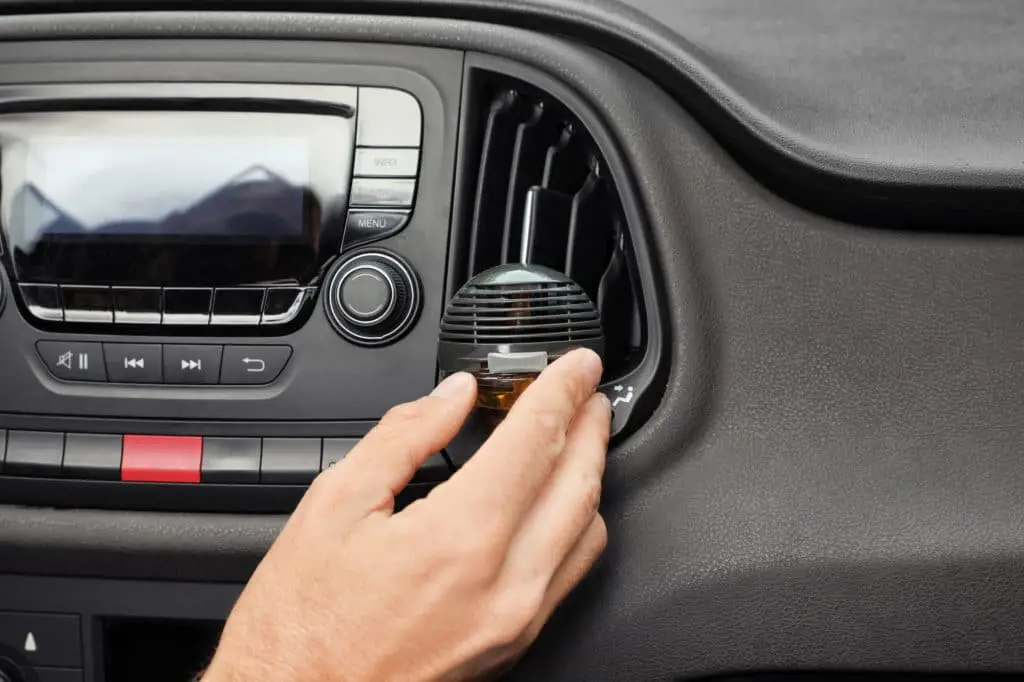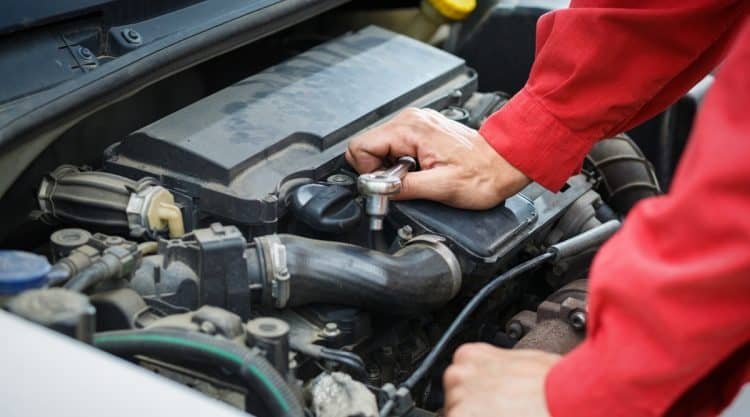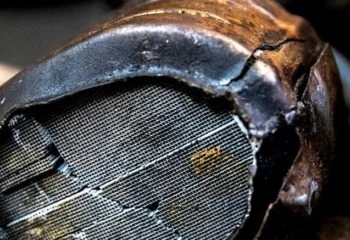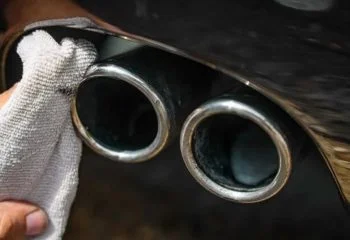If your car smells like rotten eggs, it’s important to determine the cause and take appropriate action. It could be a problem with the emission system, or something else altogether.
In this blog post, we’ll cover the causes of a car smells like rotten eggs, how to diagnose the problem, and how to fix it.
We’ll also discuss some potential consequences of not fixing the issue. So if your car smells like rotten eggs, read on for more information.
What's in this post?
What is the rotten egg smell?

The rotten egg smell is caused by a chemical reaction between sulfur and iron. When these two elements come into contact with each other, they create a gas called hydrogen sulfide.
Hydrogen sulfide is a toxic gas that can be fatal in high concentrations. It’s also what gives rotten eggs their signature smell.
What causes a car smells like rotten eggs

A car that smells like rotten eggs is usually the result of a problem with the vehicle’s exhaust system.
Leak in the exhaust manifold
If your car smells like rotten eggs, it could be a sign of a leak in the exhaust manifold. The manifold is responsible for collecting and funneling exhaust gases away from the engine.
Over time, the high temperatures of the exhaust gases can cause the metal to expand and contract, eventually leading to cracking.
In addition, corrosion can also weaken the metal and lead to leaks. In some cases, a poor seal between the manifold and the engine block can also cause exhaust gases to leak out.
If there’s a crack or hole in the manifold, those gases can escape and mix with the air inside the car, resulting in that telltale sulfurous smell.
In addition to being unpleasant, this can also be dangerous, as inhaling too much sulfur dioxide can lead to respiratory problems.
Damaged catalytic converter (CAT)
Another possible cause is a defective catalytic converter. A catalytic converter is designed to convert harmful compounds in exhaust fumes into less dangerous substances.
However, if the CAT is not functioning correctly, these compounds can build up and escape into the air, causing that distinctive sulfurous smell.
There are several reasons why a catalytic converter can become faulty. One common problem is a build-up of carbon deposits on the catalyst, which can reduce its effectiveness.
Another issue is damage to the converter itself, which can be caused by physical impact or exposure to extreme temperatures.
In some cases, the converter may also become clogged with exhaust gases, preventing them from flowing through as intended.
Ultimately, any factor that hinders the converter’s ability to properly clean and convert emissions can cause it to become faulty.
In addition to being unpleasant, this smell can also be an indication of other problems with the vehicle, such as an engine misfire or a leak in the exhaust system.
Transmission fluid
Transmission fluid that has been contaminated with gasoline can produce a strong smell that is often described as resembling rotten eggs.
The gas contamination occurs when the transmission fluid leaks into the engine, where it is then burned along with the fuel.
The burning process releases sulfur-containing gases that are emitted through the exhaust system, causing the car to smell like rotten eggs.
In addition to being unpleasant, this gas contamination can also cause damage to the engine and transmission.
If you notice your car smells like rotten eggs, it is important to take it to a mechanic so they can diagnose and repair the problem.
Faulty fuel pressure sensor
The fuel pressure sensor is located in the fuel line and measures the pressure of the fuel in the line. If the sensor is not working properly, it can cause the fuel pressure to fluctuate.
This can make the car smell like rotten eggs because the fuel is not being burned efficiently. In addition, a faulty sensor can also cause the car to stall or run rough.
There are several reasons that can make a fuel pressure sensor faulty. The most common culprit is a build-up of contaminants on the sensor, which can interfere with its ability to accurately measure fuel pressure.
Another possible cause is a problem with the electrical connection to the sensor, which can make the sensor to reading inaccurately or intermittently.
In some cases, a faulty fuel pressure sensor may simply be due to a manufacturing defect.
In either case, it’s important to have the problem fixed as soon as possible, as it can indicate a serious issue with the vehicle’s engine.
How it will affect my car?
If your car smells like rotten eggs, it is important to have it checked out by a qualified mechanic asap.
The smell can be an indication of a problem with the engine or exhaust system, which can lead to damage if not repaired.
In addition, the smell can also be caused by a build-up of contaminants in the fuel system, which can cause the car to stall or run rough.
Ultimately, any factor that hinders the converter’s ability to properly clean and converts emissions can cause it to become faulty.
In addition to being unpleasant, this smell can also be an indication of other problems with the vehicle, such as an engine misfire or a leak in the exhaust system.
How to fix a gas that smells like rotten eggs step by step

If your car smells like rotten eggs, it could be due to a leak in the exhaust system. If you have a gasoline-powered car, the problem could also be with the fuel injectors. Here are some steps you can take to troubleshoot the issue and get rid of the bad smell:
- Check the exhaust system for leaks. If there is a hole or crack in the pipe, it could be allowing sulfur gas to escape and produce the rotten egg smell. Have a professional mechanic inspect and repair the exhaust system if necessary.
- Clean or replace the fuel injectors. Over time, deposits can build up on fuel injectors, causing them to work less efficiently. This can cause a sulfur-like smell to come from the engine. Cleaning or replacing the fuel injectors should fix the problem.
- Has the catalytic converter been replaced? If the catalytic converter is not working properly, it can cause a sulfur smell. This is a more serious problem that will require professional repair.
- Check for leaks in the EVAP system. The EVAP system captures fuel vapors and recirculates them back into the engine to be burned. If there is a leak in this system, it can cause a rotten egg smell. Have a professional mechanic inspect and repair the EVAP system if necessary.
- Run the engine with the hood open. This will help to ventilate the engine compartment and get rid of the bad smell.
These are some steps you can take to fix a car that smells like rotten eggs. If the problem persists, it is best to consult a professional mechanic for further diagnosis and repair.
What are the costs associated with fixing a car smells like rotten eggs?

The cost of fixing a car that smells like rotten eggs will vary depending on the underlying cause of the problem.
If the issue is simply a clogged catalytic converter, you may be able to clean it out yourself for a few hundred dollars.
However, if the problem is more severe, such as a cracked exhaust system, you may need to pay several thousand dollars for repairs.
Additionally, if the problem is caused by dirty or faulty fuel injectors, you will likely need to pay to have them cleaned or replaced.
Ultimately, the best way to determine the cost of repairs is to take your car to a qualified mechanic and have them diagnose the problem.
How to prevent this happen again?
As any car owner knows, a foul-smelling exhaust is not only unpleasant, but it can also be a sign of serious problems.
Fortunately, there are a few things you can do to prevent your car from smelling like rotten eggs in the future.
First, make sure to have the catalytic converter replaced or cleaned regularly. This is because the catalytic converter helps to convert emissions into less harmful substances, and it can become clogged over time.
Second, have the fuel injectors cleaned or replaced as needed. Fuel injectors are responsible for spraying fuel into the engine, and they can become clogged with deposits over time.
Finally, make sure to regularly inspect the exhaust system for leaks and cracks. If left unchecked, these leaks can cause fumes to enter the cabin of the vehicle, leading to an unpleasant smell.
By following these simple tips, you can help keep your car smelling fresh and running smoothly.
FAQs
Should you drive a car has gas smells like rotten eggs?
No, It is not safe to drive a car if it has rotten eggs smells. Rotten egg smell is hydrogen sulfide, and it is a poisonous gas. It can cause headaches, dizziness, nausea, and even death in high concentrations. If you smell hydrogen sulfide while driving, pull over immediately and call for roadside assistance.
How long does it take to fix a car that smells like rotten eggs?
The amount of time it takes to fix a car that smells like rotten eggs will vary depending on the underlying cause of the problem.
If the issue is simply a clogged catalytic converter, it may only take a few hours to clean it out. However, if the problem is more severe, such as a cracked exhaust system, it could take several days or even weeks to repair.
Can an exhaust leak cause a car rotten egg smell?
Yes, one of the most common exhaust leak symptoms is the rotten egg smell. If you notice the gas that smells like rotten eggs, it’s more likely that the issue is with your car’s exhaust system. Check for leaks and cracks, and repair or replace any damaged parts.
Can a bad car battery cause a rotten egg smell?
A bad car battery can indeed cause a rotten egg smell. When a lead battery starts to fail, it produces hydrogen sulfide gas.
This gas has a distinct odor that has been described as smelling like something between rotting eggs, a sewer or well water.
Conclusion
Car smells like rotten eggs can be an incredibly unpleasant experience. The smell of your car can be a sign that there is a bigger problem.
If you are having this problem, it is important to know how to diagnose and fix the problem as soon as possible.
There are many potential causes of a car smelling like rotten eggs, but some of the most common ones include an exhaust leak or a problem with the catalytic converter.
By understanding the causes of this smell and taking the appropriate steps to address it, you can get your car smelling fresh again in no time.





